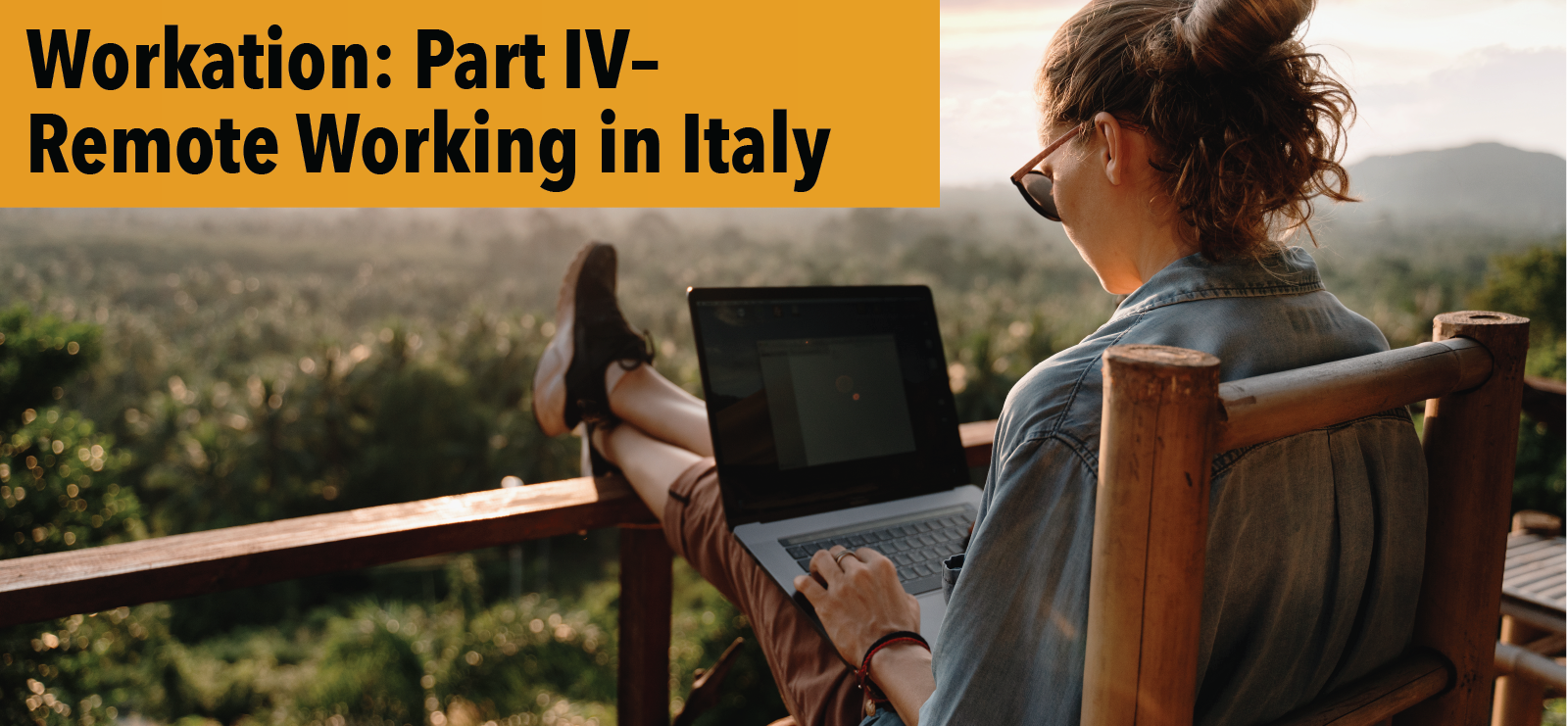REMOTE WORK IN ITALY
Is your employee asking to work remotely from abroad? Technologies make it possible, but what are the legal implications?
Our Labor & Employement Practice Area Group shared their insights and experiences on topic of “workaction”, i.e work-from-anywhere in the different jurisdictions outlining the main issues that an employer should take into consideration. We have created a seven part series on this topic.
Part IV of VII explains Italian position on this topic.
Background
In a progressive phase out of the pandemic emergency many companies are proceeding to make agile work a more structural concept by signing individual agreements that take into account the specific business environment.
Currently, there is no Italian or EU regulation that expressly governs or prohibits the possibility of working remotely from abroad. However, companies are increasingly faced with the need to consider more flexible work arrangements, including smart working outside the national territory, that will help to retain talented employees.
LEGAL POSITION IN ITALY
Remote working is regulated in Italy by law. Such statutory provisions clearly state that one of its main feature is the freedom of the employee to choose their place of work, also outside the employer’s premises. It can then be concluded that a smart worker can theoretically perform their activity also from abroad, unless the individual agreement provides otherwise. Therefore, in case the employer intends to allow one or more of its employees to work remotely from abroad, it is of essence to enter into individual agreements to discipline decisive aspects such as the duration of the agreement, the activity to be performed, salary, taxation, reimbursement of expenses, if any, insurance, etc.
Applicable Law
Let’s assume that an employee hired by a foreign employer decides to move to Italy to work from there on a permanent basis (or for most of the time): irrespective of the law chosen by the parties, if any, it cannot be excluded that Italian Law applies in case it is more favorable to the employee, as provided by Rome Convention I).
Differently, specific rules apply in case of employees seconded in Italy for a performance of a service contract. Namely, legislative decree implementing the “EU Directive on Posting of workers in the framework of provision of services” sets forth that same minimum working conditions provided for in Italy by regulatory provisions and collective agreements must apply (e.g. salary, period of rest, holidays, safety, etc.). Moreover, should the duration of the secondment exceed 12 months, each and any employment mandatory provisions in Italy must apply (except those related to termination of employment, competition or supplementary pension plans).
Social security and public insurance against accident at work
The employer should always consider that according to the general principle of “territoriality” social security contributions and public insurance must normally be paid by the employer in the country where the working activity is performed. Therefore, should an employee ask to steadily work from Italy, while the employer does not have an entity in Italy, the company needs to appoint a “social security representative”. The latter shall act before the competent Italian social security and insurance Institutions in order to represent the foreign employer, open the relevant positions and pay social security and insurance contributions on its behalf.
A totally different approach could be taken when the decision to send the employee to work abroad is taken by – in the interest of – the employer. In this case, whether it is a secondment or a business travel, there are exceptions to the principle of territoriality, as defined within EU by Regulation 883/2004 and in some non-EU countries by bilateral social security agreements that Italy has concluded with a number of States. As a consequence, social security and insurance contributions can be continued to be paid by the employer in the country of origin, for a limited period of time (e.g. maximum two years according to Regulation 883/2004).
Also not to be underestimated are the issues arising from work-related accidents which might occur abroad to the employee in smart working. In Italy the relevant institution may not guarantee any public insurance coverage. In particular, it could be an impediment to benefit from the national insurance coverage the fact that the employee is not abroad because of the employer’s needs (as, for example, in case of business travel or secondments), but because of their personal choice.
Safety at the workplace
Rules governing health and safety of workers are of public policy and necessary enforcement. As a consequence, irrespective of the law governing the employment contract, foreign employers must comply with Italian Health and Safety provisions when their employees work in Italy. To this end, among other things, foreign employers must appoint a “worker protection and prevention responsible” to ensure compliance with local law.
Immigration
Non-EU citizens must apply for a permit to work and stay in Italy and such permits can be granted within national quotas annually set forth by the government, unless in specific cases provided by immigration law where quotas do not apply (e.g. executives or other highly skilled personnel within intercompany mobility, employees temporarily transferred in Italy in the context of a service contract to be performed in Italy, etc.).
It is to mention a very recent amendment to the Italian Immigration Law facilitating “digital nomads and remote workers” to enter and work in the country. Digital nomads and remote workers are defined as third-country nationals who perform highly skilled labour activity through the use of technological tools that allow them to work remotely, on a self-employment basis or for an employer also not resident in the Italian territory. For such individuals, in case they carry out the activity in Italy, a work authorization and residence permit is not required, subject to the acquisition of an entry visa which is issued for a period not exceeding one year, provided that the holder has the availability of health insurance, covering all risks in the national territory, and that the tax and social security contribution provisions in force in Italy are complied with.
Tax Risk for The Company (Permanent Establishment)
From a tax point of view, if the smart worker carries out their activity abroad the “183 days” rule applies.
Let’s assume that a foreign employer allows its employee to work in Italy for a period of more than 183 days within the tax period: the employee income will be taxed in Italy. Moreover, should the foreign employer not have an entity in the Italian territory, it may not be required to withhold employee’s taxes on the remuneration paid and the parties can agree that the employee shall be responsible to pay its own taxes. In this respect, it is to mention that Italy currently has a favourable tax regime for people moving their residence to work in Italy for at least a couple of years (“regime impatriati”), if certain requisites are met.
With reference to the employer’s taxation, it is advisable to carefully analyse the risk that the Italian tax authority identifies the existence of a permanent establishment of the foreign company and request the payment of the relevant tax on the income deemed to have been generated in Italy. In this respect, it is important to limit the duties to be carried out in Italy by the employee to those which cannot be considered included in the core business of the company, but rather preparatory or ancillary.
Please follow these short series for Part IV where we will explore the Dutch position on the topic of “workation”.
FOLLOW US ON LINKEDIN
SEE MORE ALIANT INSIGHTS




